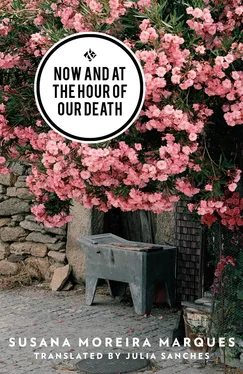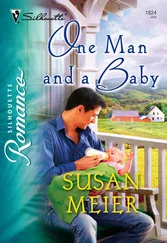Now that their children have started traveling back to Angola, to try to reclaim the farm that was once theirs, in the south of the country, I wonder if Senhor João and Senhora Maria ever think of the possibility of their children moving so very far away, and then of their grandchildren leaving too; of how, after they die, the younger generations might never visit Santulhão again. The cemetery, which is just there, you can see it from their porch, to the left of the house and in front of the café — will it become a place exclusively for the dead?
It doesn’t make Senhor João and Senhora Maria unhappy to spend their old age in the place they were born, and yet they can’t but help feel that they’ve lost part of their identity to history and that there is more defeat in life than there ever will be in death.
Senhor João crosses his long, tanned hands over his belly, his urine bag pushed to one side, and turns to face the sun, the west, looking out into the distance. Senhora Maria looks out at her vegetable garden in their front yard, at the road, at her husband.
As they sit on the porch, at the end of the day, Senhor João and Senhora Maria see what the younger generations do not: bygone landscapes. In their eyes, the sun slowly bruising through long months of unbearable heat, there is still time to hope everything ends there, on that purple horizon.
HIM: I dream more than I sleep. Or maybe it’s all jumbled up. I don’t know.
HER: Sure he dreams, and sometimes he kicks me, too. I ask him what’s wrong and he says: oh, I was just hunting in Angola.
HIM: In Angola, we’d go hunting every week, sometimes even two, three times. There was wild goats, antelopes, game. Soon’s the dry season hit, they’d come searching for drinking water.
HER: Goats, they’d come in bean season. One day he asked me: what we got for lunch tomorrow? ’Cause we had so many chickens and pigs and—
HIM: One year we killed eighteen of them!
HER: He said: look, there’s a goat eating the beans. Gonna see if I can grab him. I hadn’t even finished washing the dishes and there he was bringing in two of them goats. The blacks, they knew the sound of his gun and so they’d come knocking at my door the next day, saying I’m here to help with the skinning, Senhora. And I’d say, alright then, cut here and cut there and take this here for you. They’d be so darn happy! Senhora, you give us balela today?
HIM: They called meat balela.
HIM: I’m eighty now. And here I am, fearful I might fall sick before I die. My kids, they tell me: you gotta try taking it one day at a time now.
When I got back from Angola and had this operation in Vimioso, the doctor said to me: oh, you’ll live to see eighty yet! But I felt downright bad. I don’t know if it was because of how I had to leave Angola that I felt so bad, but I asked him, me, eighty? And now I’ve made it to eighty, you know what I’m hoping for? To make it to ninety. You know what makes me really happy? It’s not doing the living myself, it’s getting to see the family, the kids, the grandkids. My oldest grandson, he’s a mechanical engineer, another one’s studying to be an architect. The daughter of our eldest, she’s a nurse. Another granddaughter, she’s finishing up school to be a scientist. And she’s already making a living at a university in France…
HER: She’s doing her PhD.
HIM: And my youngest son’s kid, he’s a police officer. I got no great-grandchildren yet. That’s why a person’s got to keep going.
HER: Our oldest grandkid is twenty-six, but he ain’t given any thought to marriage yet.
HIM: It ain’t easy living in the city. Here, in the village, we’ve got a house, a vegetable patch, and we just keep on.
HER: There ain’t a day goes by we don’t eat what our garden grows.
HIM: And then there’s even some left for the kids.
HER: Folk don’t go hungry here. Everyone’s growing things. There’s always enough.
HIM: But back in the day, the houses was full of people. Now everywhere’s empty. There’s some’s left, others died. There’s only five, six kids in the school now and they go to Vimioso, ’cause there ain’t no schools in Santulhão anymore.
HER: Back then, families were big, they’d have ten, twelve kids, and you needed a plentiful garden to fill the pot. Folks went hungry. There was lice, and there were ticks. We were dirt poor back then.
HIM [pointing at the houses opposite]: Over there, where them houses are now, there was mud. And you mixed it in with straw and you had yourself some fertilizer.
HER: My ma was real sick, and truly devoted to the saints. She went down to Mirandela one time to pray, and me and my brother, we went with her and we saw this bicycle. We just stared at it, ’cause we’d never seen one before. No one bought us kids bikes, there wasn’t any money for presents.
HIM: When I was about ten, we had a pair of stilts…
HER: They used to get all banged up.
HIM: … and we’d strap our feet into them and walk all over the place.
HER: We had seven kids. The first two died: one at five and a half months, the other when he was born. I cried and cried thinking that maybe none might survive… The best thing in life’s your kids. Everything else is just… We left everything we had behind in Angola. But our kids, thank the Lord, they make enough to keep themselves afloat. They’re smart and they’ve got skills enough to work. There never was much, but we sent them to school with the little we had.
HIM: There ain’t a thing I regret selling.
HER: I would’ve sold our land so the kids could go to school. If we’d gone to school ourselves, we wouldn’t’ve held onto our land like we did, we would’ve got jobs. He had to finish elementary school to get his driver’s license in Angola.
HIM: Who finished elementary school round here back then? We worked like slaves.
HIM: When I went to Angola, there was lots of folks here and almost nowhere to harvest grain. Before that, I even tried getting to France. I gave a doctor from Bragança one and a half contos (speaking in contos, which is what we used back then). The doctor said he got people across the border and he had this middleman in Vimioso. The plan was that after he got me papers, I’d give him another one and a half contos. But time passed, and then some more… He must’ve conned ’bout six hundred people. There was lots of us waiting to go to France. And then in the end not one of us did. Those days, there wasn’t any tv, but I heard this broadcaster say on the radio: come to Angola, my brothers, hardworking men of Trás-os-Montes. I had a cousin of mine in Angola and he was a sergeant in the army, and I wrote him a letter and then he wrote me back saying: cousin, you’re not going to believe it! They harvest twice a year out here! First, two guys from over here went there, then me, then three more. Then it was like a flood: more than thirty folk from here went over.
I was already sick back then. I’d say to her, I got an ulcer and she’d go, there ain’t nothing wrong with you. I’d say, yeah there is, and I need surgery. Those days, you need an operation, you gotta pay, and we didn’t have no money for that, we would’ve had to sell all we had, and that’s why I left here so fast. But there in Luanda, with that food and that weather, I hurt even more. I was lucky enough, though, ’cause I knew someone there, a lady who was the daughter of a teacher from over here, the one who’d taught me my letters, and she was a teacher, too, and married to an engineer who was in charge of the railways, and he told me to go see his friend, who worked at a clinic. He wrote a little something on a piece of paper for me to show him and they saw me right then and there. They operated and then after the operation they told me: you gotta go on a diet now. But I was never much a nagger, I never asked for nothing. I was staying in this shelter and there was six hundred and some more of us there — there was family men, sick folk, some missing a hand, others who was blind. That was where all us outcasts went. All the poor folk were there and we lived crammed into this barrack made of zinc, it went from over here to about there, to that cherry tree. The outhouse was over a cesspit, there was just a lone plank of wood and no water. There was loads of old folk, some from here, some from Angola, folk who should’ve been in a home, and they were almost always fighting like dogs. When I got there from the hospital, they all gabbed behind my back, saying: that one there, he won’t last. And I heard them, too… I got so down. I was thirty years old, I hadn’t even turned thirty-one yet, I had my operation three days before I turned thirty-one. That was forty-nine years ago.
Читать дальше












